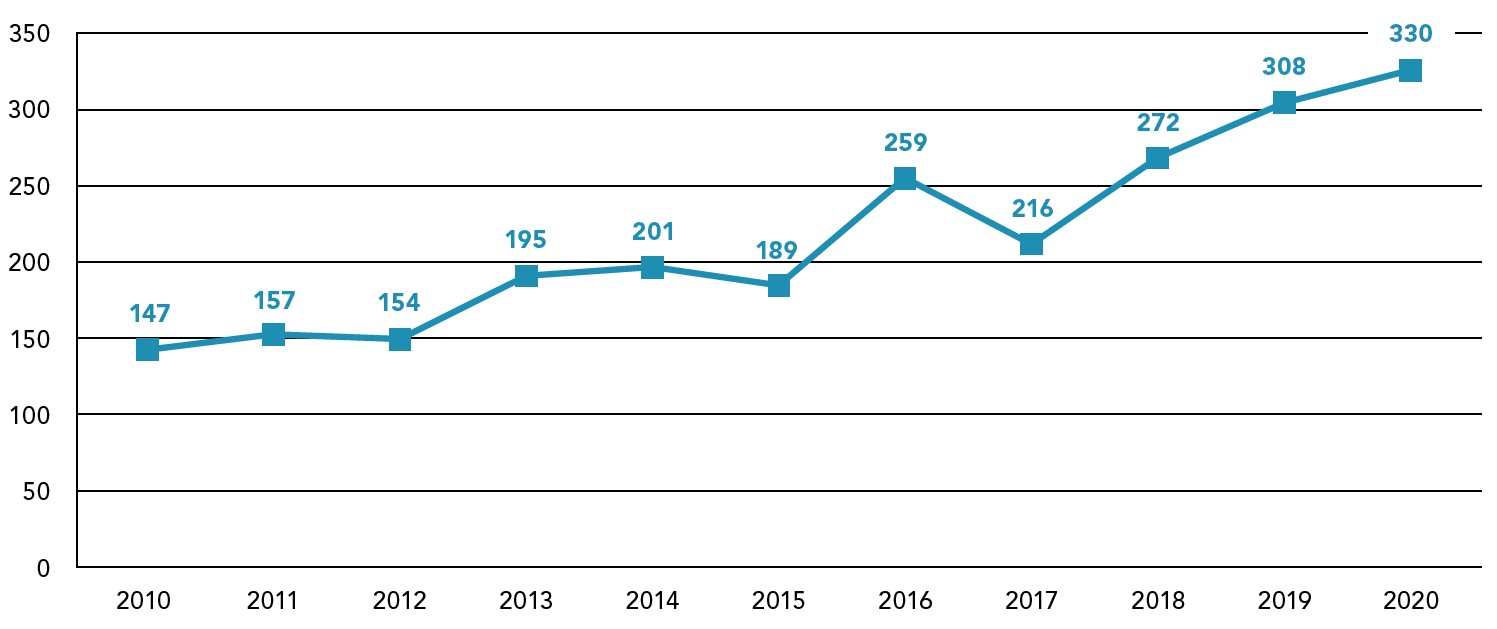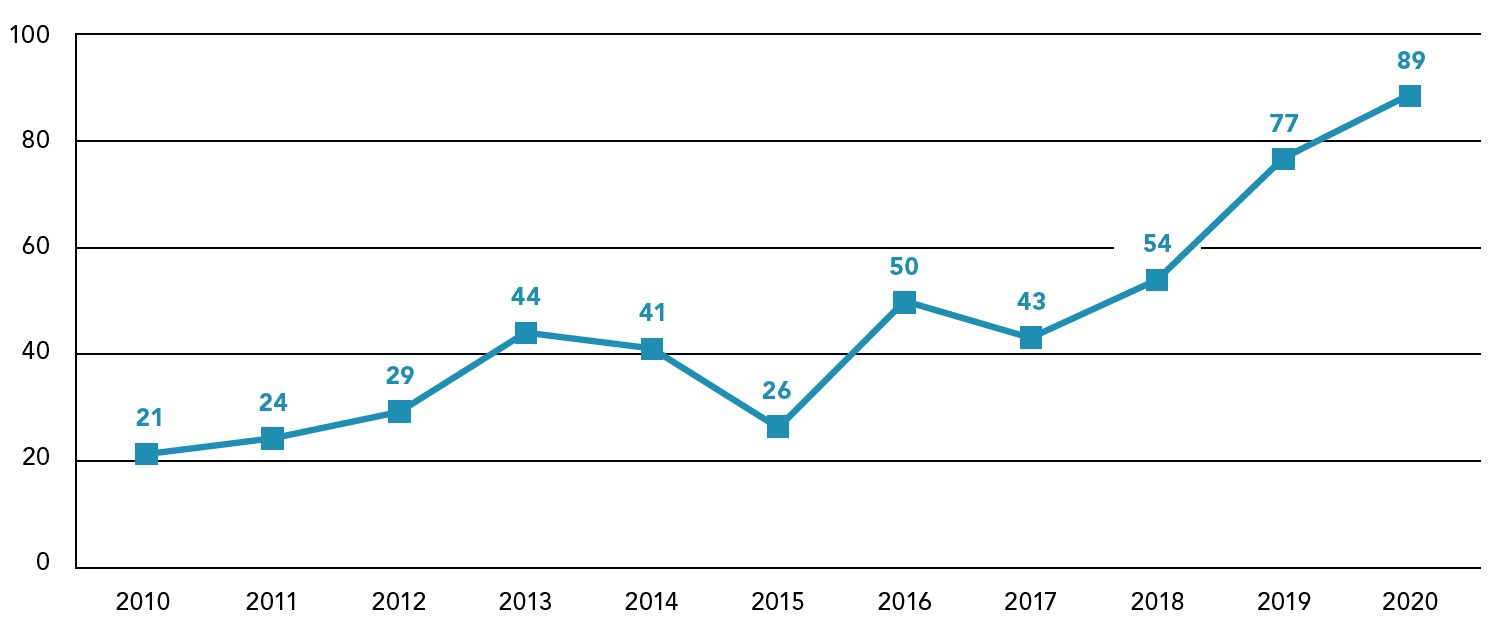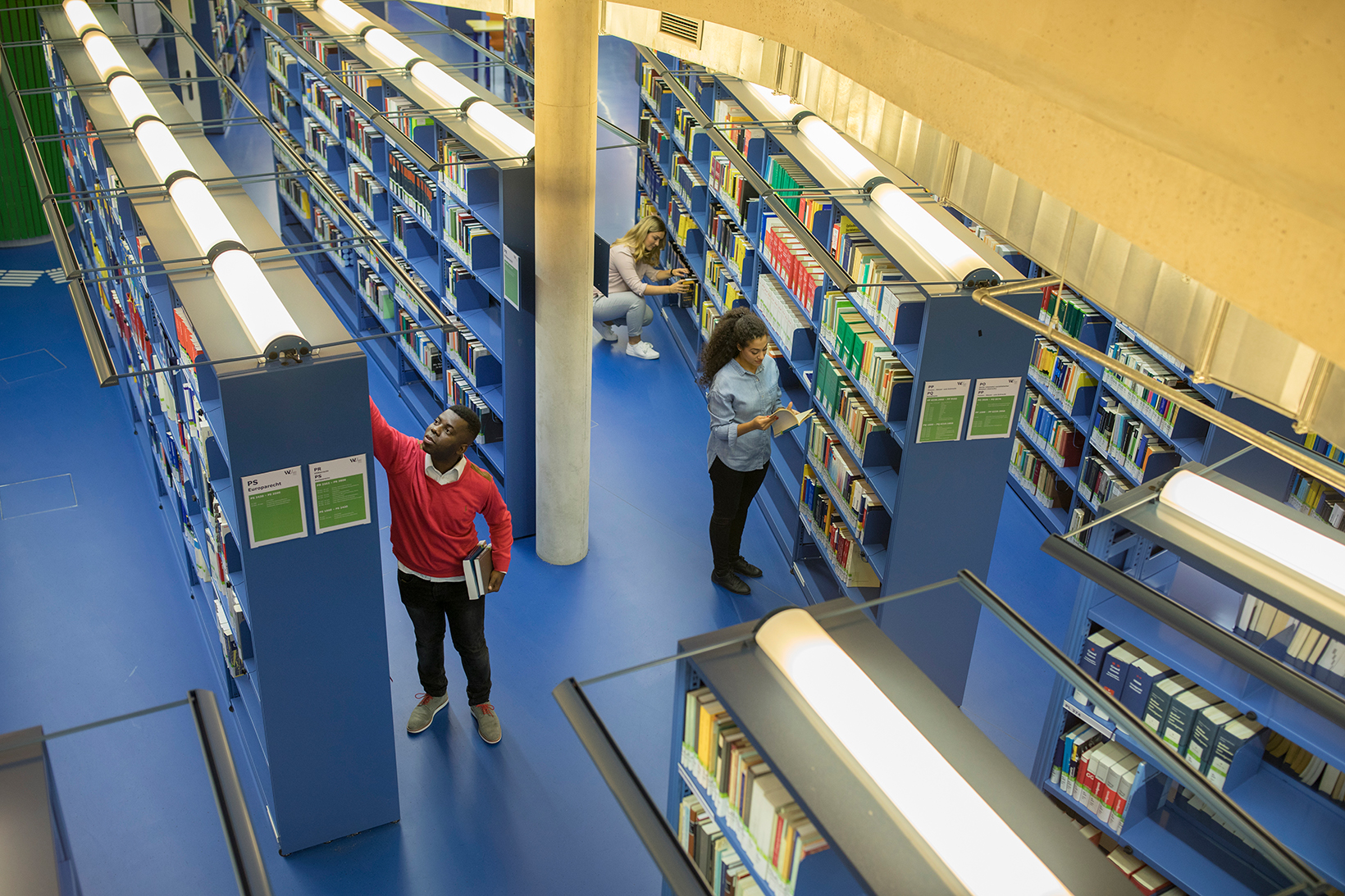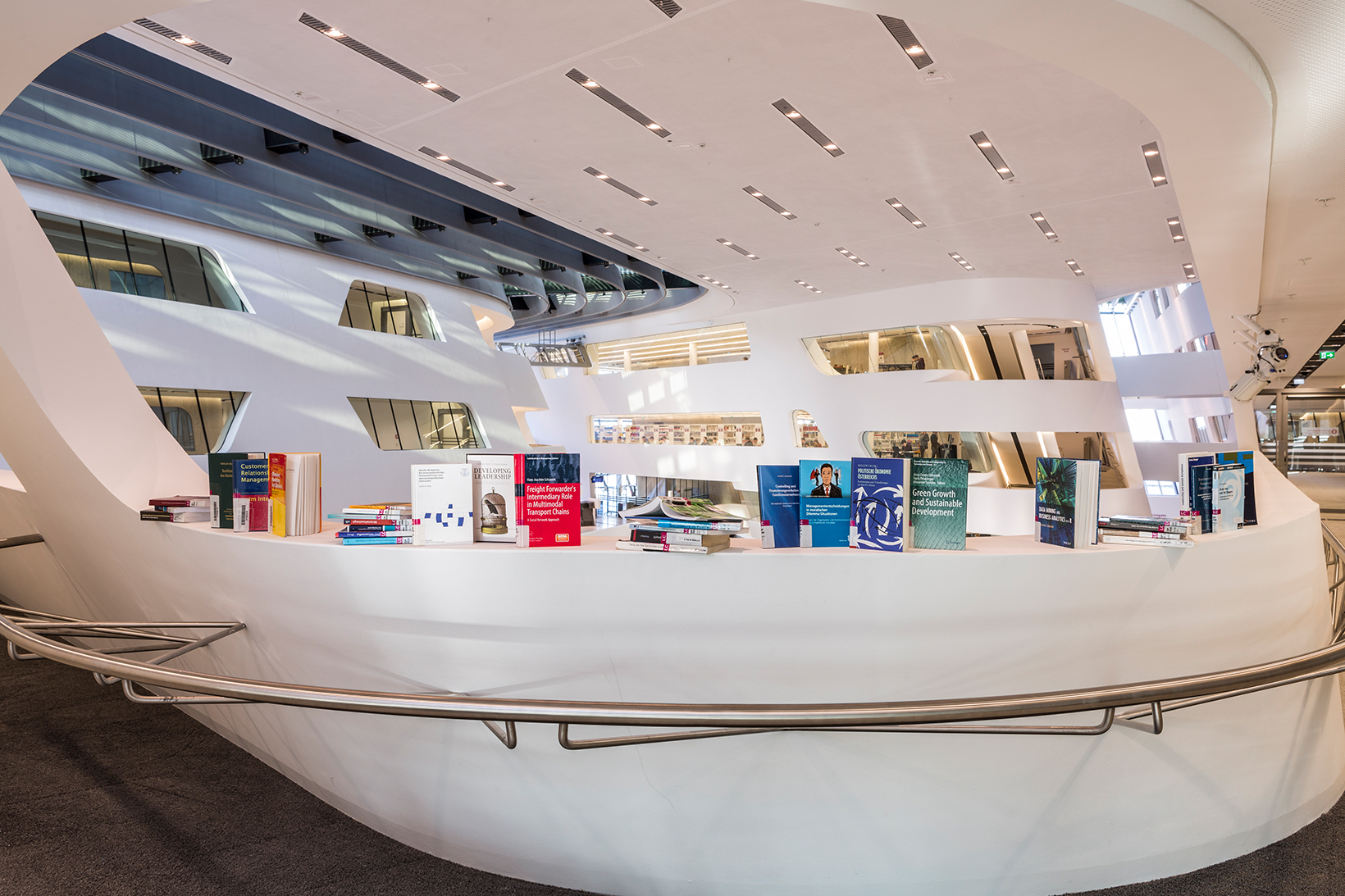Highly Published Researchers
WU’s academic output, as measured in papers published in international, peer-reviewed journals (Scopus), has increased considerably in recent years. After publishing over 300 papers for the first time in 2019, WU’s researchers topped this by publishing 330 papers in Scopus-indexed journals in 2020.

The development with regard to the number of publications in particularly highly regarded journals (Scimago Journal & Country Rank) was also positive. This means that WU’s researchers are not only publishing more and more, they are also publishing their work in top international journals.

International Research Collaborations
ENGAGE.EU
Participation in the European University ENGAGE.EU will strengthen WU’s ties to the European scientific community and enrich our research. The focus is on the UN’s Sustainable Development Goals (SDGs) and the challenges our society is currently facing. The cooperation will be based on interdisciplinary activities like think tanks, data pools, and research and innovation Networks.
Horizon 2020
Communities for Sciences (C4S)
Project heads (WU): Christian Rammel and Martin Wildenberg, Competence Center for Sustainability Transformation and Responsibility
The main objective of C4S is inclusive teaching in the sciences based on the following three main pillars:
- Working with vulnerable groups
- Raising awareness of value-laden practices in science education at an institutional level
- Promoting engagement in inclusive science education
The project is coordinated by Fundació Universitària del Bages. WU is mainly responsible for the area “Responsible Research and Innovation,” forging a link between the project goals and the practical work with vulnerable groups.
Human-AI Teaming Platform for Maintaining and Evolving AI Systems in Manufacturing (TEAMING.AI)
Project head (WU): Axel Polleres, Institute for Data, Process and Knowledge Management
The TEAMING.AI project aims to take intelligent manufacturing to the next level. Manufacturing processes will be optimized by introducing a new teaming framework for humans and AI: The greatest strengths of both elements can be optimized while complying with strict ethical and safety guidelines.
The project is coordinated by Software Competence Center Hagenberg GmbH.
SUstainable Management in EXtractive Industries (SUMEX)
Project head (WU): Robert-Andre Martinuzzi, Institute for Managing Sustainability
The SUMEX project is developing a framework for the extractive industries in Europe intended to cover the entire value chain. The aim is to analyze all relevant economic, environmental, and social policy frameworks of the EU and its member states as well as selected regions. The focus will be on socioeconomic and environmental impact assessments, health, and safety.
The project is coordinated by Montanuniversität Leoben.

Austrian Research Promotion Agency (FFG)
Generative Learning Networks for Text and Impact Optimization (GENTIO)
Project head (WU): Kurt Hornik, Institute for Statistics and Mathematics
Automatic extraction of knowledge from digital content is an active research field, and significant developments and progress have been made in this area in recent years. Building on these recent advances, GENTIO aims to fundamentally revolutionize access to digital content production, enrichment, and analysis. One key innovation of the project is the development of a multi-task learning (MTL) approach based on so-called generative learning networks to integrate three different levels of text interpretation: structural, content, and contextual text interpretation.
The project coordinator is webLyzard technology gmbh.
ERASMUS+ (teaching and research collaborations)
- Leadership and Organisation for Teaching and Learning at European Universities (Lotus)
Project head (WU): Oliver Vettori, Program Management and Teaching & Learning Support - Greening Energy Market and Finance (GrEnFIn)
Project head (WU): Irene Monasterolo, Institute for Ecological Economics - New Mechanisms of Partnership-Based Governance and Standardization of Vocational Teacher Education in Ukraine (PAGOSTE)
Project head (WU): Richard Fortmüller, Institute for Business Education - BPM and Organizational Theory: An Integrated Reference Curriculum Design
Project head (WU): Jan Mendling, Institute for Data, Process and Knowledge Management - Teaching Digital Entrepreneurship
Project head (WU): David Martin Herold, Institute for Transport and Logistics Management - Enabling Social Entrepreneurs to Scale their Impact Internationally
Project head (WU): Peter Vandor, Competence Center for Nonprofit Organizations and Social Entrepreneurship - Social Return on Investment: Enhancing Knowledge and Skills for Social Impact
Project head (WU): Christian Grünhaus, Competence Center for Nonprofit Organizations and Social Entrepreneurship - Economic Policies for the Global Transition
Project head (WU): Clive L. Spash, Institute for Multi-Level Governance and Development

National Funding Agencies
OeNB Anniversary Fund
- Tax Challenges of the Digitalization of the Economy
Project head: Michael Lang, Institute for Austrian and International Tax Law - The Effects of Carbon Pricing and Taxes on Induced Innovation
Project head: Klaus Gugler, Department of Economics - Nontradable Goods and Fiscal Multipliers
Project head: Jesus Crespo Cuaresma, Institute for Macroeconomics - Multivariate Ordinal Regression Models for Enhanced Credit Risk Modeling
Project head: Laura Vana, Institute for Statistics and Mathematics - Globalization, Digitalization, and Selecting a Location for Corporate Headquarters and Start-Ups
Project head: Phillip C. Nell, Institute for International Business - Private Bankruptcy in Austria
Project head: Stefan Angel, Institute for Social Policy - Transition Risk Management in Monetary Policy and Finance Regulation and the Stability of the Growth Regime
Project head: Louison Cahen-Fourot, Institute for Ecological Economics - An Economic Model of Fake News
Project head: Melis Kartal, Department of Economics - The Multilateral Instrument and its Effects
Project head: Alexander Rust, Institute for Austrian and International Tax Law
Vienna Science and Technology Fund (WWTF)
- The Effects of the SARS-CoV-2 Measures on International Economic Activity and Domestic Employment Rates
Project head: Jonas Puck, Institute for International Business - Citizen Solidarity During the Coronavirus Crisis
Project head: Jurgen Willems, Institute for Public Management and Governance

Top-Quality Doctoral Programs
International taxation is a key research and teaching area at WU. The PhD Program in International Business Taxation is aimed at future researchers in the disciplines of finance, business taxation, and international tax law and provides an interdisciplinary education in the field of the taxation of cross-border business activities. As one of only four programs at all Austrian universities, the program was awarded doc.funds funding from the Austrian Science Fund (FWF).
WU has also been a partner of the Vienna Graduate School on Computational Optimization (VGSCO) since October 2020. The VGSCO has received funding from the Austrian Science Fund (FWF). The program is a cooperation between WU, the University of Vienna (coordinator), TU Wien, and the Institute of Science and Technology Austria (IST Austria).
WU In-House Funding
WU is proud to offer a wide spectrum of different funding opportunities, available to researchers at all career levels. With the establishment of the WU Foundation in 2020, we were able to reliably secure the funding for these programs for upcoming years, which is an important contribution to the continued successful future of research at WU.

